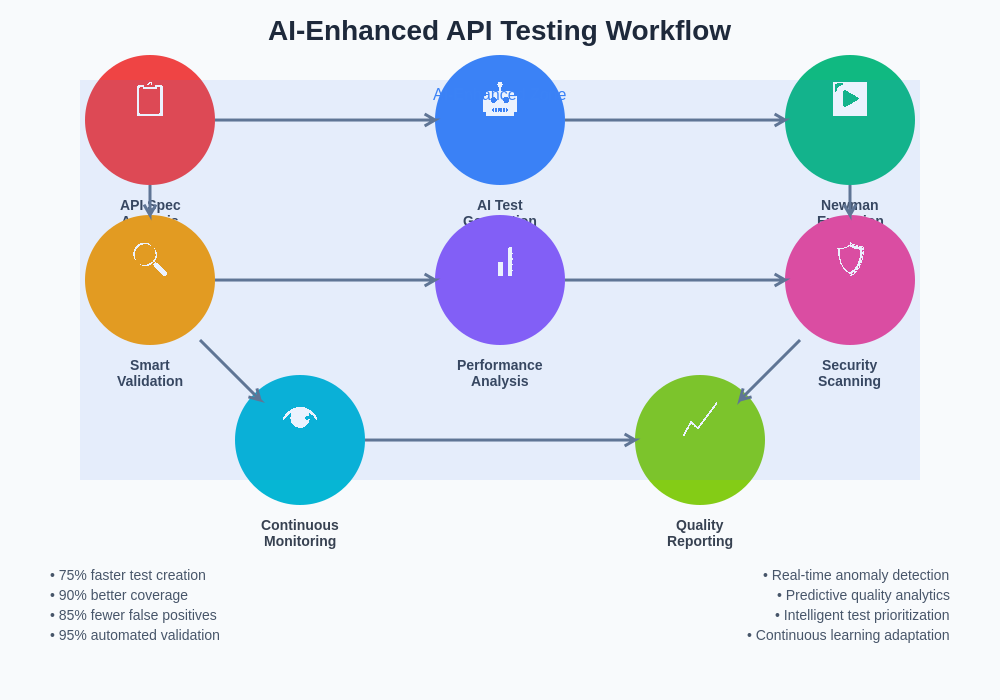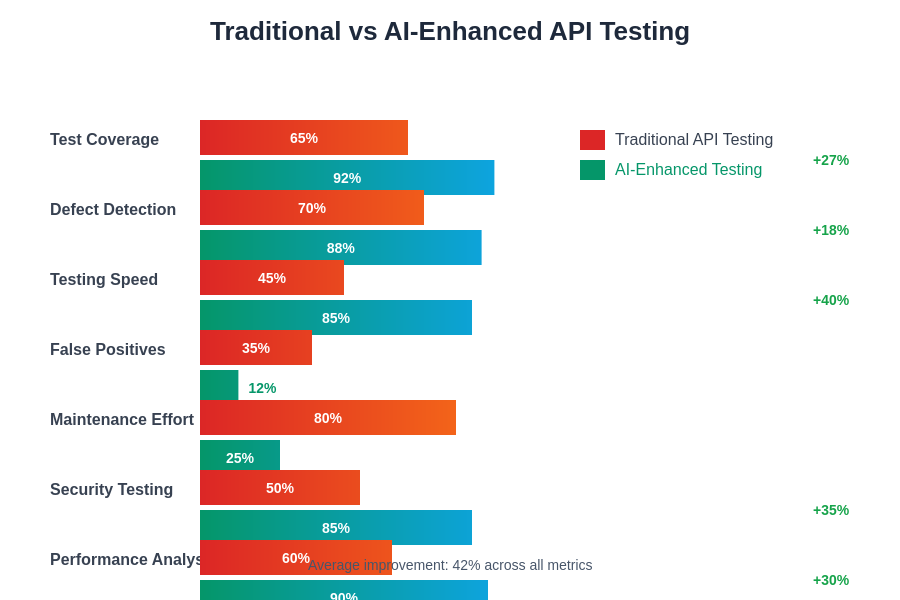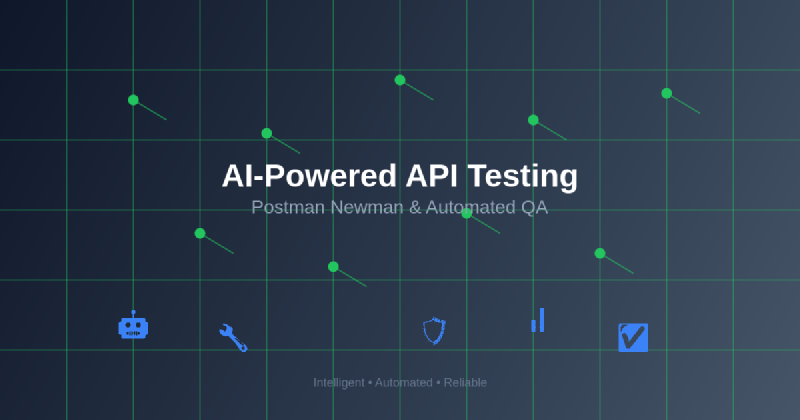The evolution of application programming interface testing has reached a revolutionary milestone with the integration of artificial intelligence into quality assurance workflows. Modern software development increasingly relies on complex API ecosystems that demand sophisticated testing strategies capable of ensuring reliability, performance, and security across distributed systems. The combination of AI-powered testing tools with established frameworks like Postman Newman has created unprecedented opportunities for automated quality assurance that adapts, learns, and evolves with changing application requirements.
Stay updated with the latest AI testing trends to leverage cutting-edge technologies that are reshaping how we approach software quality assurance in an increasingly complex digital landscape. The integration of artificial intelligence into API testing represents a fundamental shift from reactive bug detection to proactive quality assurance that anticipates potential issues before they impact production systems.
The Foundation of Intelligent API Testing
Traditional API testing approaches have long struggled with the complexity and scale of modern distributed systems, where hundreds or thousands of endpoints must be validated across multiple environments, versions, and configurations. The manual creation and maintenance of comprehensive test suites has proven both time-consuming and error-prone, often resulting in inadequate coverage and delayed release cycles. AI-powered testing solutions address these challenges by automating not just the execution of tests, but the intelligent generation, optimization, and maintenance of entire testing frameworks.
The revolutionary aspect of AI-enhanced API testing lies in its ability to understand patterns, predict potential failure points, and automatically generate test cases that cover edge cases and scenarios that human testers might overlook. Machine learning algorithms analyze API specifications, historical usage patterns, and failure data to create comprehensive testing strategies that evolve continuously based on real-world performance and user behavior. This intelligent approach to test generation ensures that critical functionality remains protected while reducing the overhead associated with maintaining extensive test suites.
Postman Newman: The Command-Line Testing Powerhouse
Postman Newman stands as one of the most versatile and powerful command-line collection runners for API testing, providing the foundation upon which AI-enhanced testing strategies can be built. This robust tool transforms Postman collections into automated testing pipelines that can be integrated seamlessly into continuous integration and continuous deployment workflows. Newman’s ability to execute complex test scenarios, generate detailed reports, and integrate with various development tools makes it an ideal platform for implementing AI-driven testing enhancements.
The power of Newman lies in its flexibility and extensibility, allowing developers to create sophisticated testing workflows that can adapt to changing requirements and scale with growing API complexity. When enhanced with AI capabilities, Newman becomes more than just a test runner; it evolves into an intelligent testing orchestrator that can optimize test execution, prioritize critical test cases, and provide actionable insights for improving API reliability and performance.
Experience advanced AI testing capabilities with Claude to enhance your API testing strategies with intelligent analysis and automated test generation that adapts to your specific application requirements. The combination of human expertise with AI-powered insights creates testing frameworks that are both comprehensive and efficient.
Intelligent Test Case Generation and Optimization
One of the most significant advantages of AI-powered API testing is the automated generation of comprehensive test cases that cover both common usage patterns and edge cases that might be overlooked in manual testing approaches. Machine learning algorithms analyze API specifications, including OpenAPI/Swagger documentation, to understand endpoint functionality, parameter types, validation rules, and expected responses. This analysis enables the automatic creation of test cases that validate not only successful scenarios but also error conditions, boundary cases, and security vulnerabilities.
The optimization aspect of AI-powered testing goes beyond simple test generation to include intelligent test case prioritization, execution ordering, and resource allocation. AI algorithms can analyze historical test results, identify patterns in failures, and prioritize test execution based on risk assessment and business impact. This intelligent prioritization ensures that critical functionality is tested first and most frequently, while less critical or stable components receive appropriate but not excessive testing attention.
Dynamic Test Data Generation and Management
Traditional API testing often struggles with the challenge of creating realistic, diverse, and comprehensive test data that accurately represents real-world usage patterns. AI-powered testing solutions address this challenge through intelligent test data generation that creates realistic datasets based on analysis of production data patterns, user behavior, and business rules. These systems can generate synthetic data that maintains referential integrity, follows business logic constraints, and provides comprehensive coverage of different data scenarios.
The dynamic nature of AI-generated test data extends to real-time adaptation based on test results and changing application requirements. Machine learning algorithms can identify data patterns that lead to failures, generate additional test cases to explore similar scenarios, and continuously refine data generation strategies to improve test coverage and effectiveness. This adaptive approach ensures that test data remains relevant and comprehensive as applications evolve and new features are added.
Automated Response Validation and Assertion Generation
Response validation represents one of the most complex and error-prone aspects of API testing, requiring detailed understanding of expected data structures, business rules, and validation criteria. AI-powered testing tools excel at automating this process by learning from API specifications, sample responses, and business logic to generate comprehensive assertion sets that validate not only data format and structure but also business rule compliance and data integrity.
The intelligence embedded in these validation systems extends to adaptive assertion generation that evolves based on observed API behavior and changing business requirements. Machine learning algorithms can identify patterns in successful responses, detect anomalies that might indicate problems, and automatically generate new assertions to catch similar issues in future test runs. This continuous learning approach ensures that validation becomes more comprehensive and accurate over time while reducing the maintenance burden associated with manually written assertions.

The transformation from traditional manual API testing to AI-powered automated quality assurance represents a fundamental shift in how development teams approach software validation. This evolution encompasses not only the automation of existing processes but the introduction of entirely new capabilities that were previously impossible with manual testing approaches.
Performance Testing and Load Pattern Analysis
API performance testing has traditionally required extensive manual configuration and analysis to identify bottlenecks, capacity limits, and performance degradation patterns. AI-enhanced performance testing automates much of this complexity by intelligently generating load patterns that simulate realistic usage scenarios based on production traffic analysis and user behavior modeling. These systems can automatically ramp up load, identify breaking points, and analyze performance metrics to provide actionable insights for optimization.
The predictive capabilities of AI-powered performance testing extend to capacity planning and scalability analysis, where machine learning algorithms can forecast future performance requirements based on usage trends, seasonal patterns, and business growth projections. This predictive approach enables proactive capacity management and helps development teams make informed decisions about infrastructure scaling and optimization strategies.
Explore comprehensive AI research capabilities with Perplexity to stay informed about the latest developments in automated testing technologies and quality assurance methodologies that are shaping the future of software development.
Security Testing and Vulnerability Detection
Security testing for APIs requires specialized knowledge of attack vectors, vulnerability patterns, and security best practices that can be challenging for development teams to maintain and apply consistently. AI-powered security testing automates the detection of common vulnerabilities such as injection attacks, authentication bypasses, authorization failures, and data exposure issues. Machine learning algorithms trained on extensive vulnerability databases can identify potential security weaknesses that might be missed by traditional testing approaches.
The adaptive nature of AI-driven security testing enables continuous learning from new attack patterns and vulnerability discoveries, ensuring that testing strategies remain current with evolving security threats. These systems can automatically generate security test cases based on emerging threat intelligence, simulate attack scenarios, and provide detailed recommendations for remediation and security hardening.
Integration with CI/CD Pipelines and DevOps Workflows
The true power of AI-enhanced API testing emerges when these capabilities are seamlessly integrated into continuous integration and continuous deployment pipelines, creating automated quality gates that ensure consistent software quality throughout the development lifecycle. AI-powered testing tools can automatically trigger appropriate test suites based on code changes, prioritize tests based on risk assessment, and provide rapid feedback to development teams about potential quality issues.
This integration extends to intelligent reporting and analytics that help development teams understand quality trends, identify areas for improvement, and make data-driven decisions about release readiness. Machine learning algorithms can analyze test results across multiple deployments to identify patterns, predict potential quality issues, and recommend optimization strategies for both testing processes and application quality.
Real-Time Monitoring and Continuous Quality Assurance
Modern API testing extends beyond pre-deployment validation to include continuous monitoring and quality assurance in production environments. AI-powered monitoring systems can analyze real-time API performance, detect anomalies that might indicate quality issues, and automatically trigger additional testing or alerting based on observed behavior patterns. This continuous quality assurance approach ensures that issues are detected and addressed quickly, minimizing user impact and maintaining system reliability.
The predictive capabilities of these monitoring systems enable proactive quality management, where potential issues are identified and addressed before they impact users. Machine learning algorithms can analyze patterns in API usage, performance metrics, and error rates to predict when systems might experience problems and recommend preventive actions to maintain optimal performance.

The quantitative benefits of AI-powered API testing are substantial across multiple dimensions of quality assurance effectiveness. Organizations implementing intelligent testing strategies consistently demonstrate improvements in test coverage, defect detection rates, testing efficiency, and overall software quality compared to traditional manual testing approaches.
The measurable improvements across key testing metrics demonstrate the transformative impact of AI integration on quality assurance processes. These enhancements translate directly into reduced production issues, faster release cycles, and improved overall software reliability.
Test Environment Management and Configuration
Managing test environments and configurations for complex API ecosystems presents significant challenges in terms of consistency, reliability, and maintenance overhead. AI-powered test environment management automates many of these challenges by intelligently provisioning test environments, managing configuration consistency, and optimizing resource utilization based on testing requirements and priorities.
The intelligence embedded in these systems extends to automatic environment cleanup, conflict detection, and resource optimization that ensures test environments remain stable and available when needed. Machine learning algorithms can analyze environment usage patterns, predict resource requirements, and optimize environment provisioning to minimize costs while maintaining testing effectiveness.
Advanced Analytics and Quality Insights
The data generated by AI-powered API testing provides unprecedented insights into software quality, performance characteristics, and improvement opportunities. Advanced analytics capabilities can identify quality trends, correlate test results with business metrics, and provide actionable recommendations for improving both testing processes and software quality. These insights enable data-driven decision making about quality investments, testing strategies, and release planning.
The predictive analytics capabilities of these systems extend to quality forecasting, where machine learning algorithms can predict future quality trends based on current development practices, testing results, and business requirements. This predictive approach enables proactive quality management and helps organizations maintain consistent software quality as they scale and evolve.
Collaborative Testing and Knowledge Sharing
AI-powered testing platforms facilitate collaboration between development, testing, and operations teams by providing shared visibility into quality metrics, test results, and improvement opportunities. Intelligent reporting and analytics help teams understand quality impacts across different components, identify areas requiring attention, and coordinate improvement efforts effectively.
The knowledge sharing capabilities of these platforms extend to automated documentation generation, best practice recommendations, and institutional knowledge capture that helps organizations build and maintain testing expertise. Machine learning algorithms can identify successful testing patterns, document effective strategies, and recommend approaches based on similar projects and use cases.
Cost Optimization and Resource Efficiency
The economic impact of AI-powered API testing extends beyond quality improvements to include significant cost savings through improved efficiency, reduced manual effort, and optimized resource utilization. Automated test generation reduces the time required to create and maintain test suites, while intelligent test execution minimizes infrastructure costs through optimized resource allocation and test prioritization.
The long-term cost benefits include reduced production issues, faster release cycles, and improved developer productivity through more effective testing feedback and quality insights. Organizations implementing AI-enhanced testing strategies typically see substantial returns on investment through improved software quality and reduced operational overhead.
Future Directions and Emerging Technologies
The evolution of AI-powered API testing continues to accelerate with advances in machine learning, natural language processing, and automated reasoning. Emerging technologies such as large language models enable more sophisticated test case generation from natural language requirements, while advanced ML techniques improve anomaly detection and predictive quality analytics.
The integration of AI testing capabilities with emerging development practices such as infrastructure as code, serverless architectures, and microservices patterns creates new opportunities for comprehensive quality assurance that spans entire technology stacks. These advances promise to further democratize effective testing practices and enable organizations of all sizes to implement sophisticated quality assurance strategies.
The future of API testing lies in the continued evolution of intelligent automation that augments human expertise rather than replacing it. The most effective testing strategies combine AI-powered automation with human insight, creativity, and domain knowledge to create comprehensive quality assurance approaches that ensure software reliability in increasingly complex technological environments.
Disclaimer
This article is for informational purposes only and does not constitute professional advice. The views expressed are based on current understanding of AI technologies and their applications in software testing. Readers should conduct their own research and consider their specific requirements when implementing AI-powered testing tools. The effectiveness of AI-enhanced testing may vary depending on specific use cases, application architectures, and organizational requirements.
